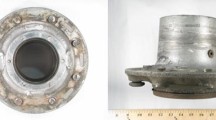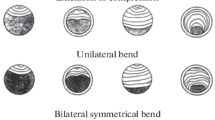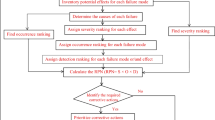Abstract
Fatigue fracture, occurring in selected industrial manufactured products and components during production, testing or service conditions, is a typical failure mode. Primarily, the main qualitative and phenomenological aspects and features of failure modes are presented for industrial components (track-type chain blocks and steel rebars), based on case history approach, and correlated with the prevailed operating loading conditions. These characteristics are mainly recorded for the identification of the emergent failure mechanism(s). The second part of the paper includes the presentation of selected methodological techniques which are briefly summarized and discussed. The aim is to provide a wider perspective of failure prevention, using the process and systems approach principles, which broaden the scope of the organization capability to address and minimize the risks and capitalize the opportunities, assisting to quality and business improvement.










Similar content being viewed by others
References
G.D. Quinn, Fractography of Ceramics and Glasses, 2nd edn. (U.S. Government, NIST, Gaithersburg, 2016)
F.K. Geitner, H.P. Bloch, Machinery Failure, Analysis and Troubleshooting, Practical Machinery Management for Process Plants (Butterworth-Heinmann, Oxford, 2012)
D.A. Ryder, T.J. Davies, I. Brough, F.R. Hutchings, General practice in failure analysis, in Failure Analysis and Prevention, ASM Handbook, (ASM International, 1986), pp. 15–46
S. Lynch, S. Moutsos, A brief history of fractography. J. Fail. Anal. Prev. 6, 54–69 (2006)
P. Psyllaki, K. Papadimitriou, G. Pantazopoulos, Failure modes of liquid nitrocarburized and heat treated tool steel under monotonic loading conditions. J. Fail. Anal. Prev. 6(6), 13–18 (2006)
B.O. Alli, Fundamental Principles of Occupational Health and Safety (International Labour Office, Geneva, 2008)
S.D. Antolovich, A. Saxena, Fatigue failures, in Failure Analysis and Prevention, ASM Handbook (ASM International, 1986), pp. 102–135
G. Pantazopoulos, A. Vazdirvanidis, A. Toulfatzis, A. Rikos, Fatigue failure of steel links operating as chain. Eng. Fail. Anal. 16, 2440–2449 (2009)
G. Pantazopoulos, S. Zormalia, Analysis of failure mechanism of gripping tool steel component operated in an industrial draw bench. Eng. Fail. Anal. 18, 1595–1604 (2011)
G.W. Powell, Identification of failures, in Failure Analysis and Prevention, ASM Handbook (ASM International, 1986), pp. 75–81
F. Berto, A. Majid, L. Marsavina, Mixed mode fracture. Theor. Appl. Fract. Mech. 91, 1 (2017)
N. Perez, Mixed Mode Fracture Mechanics, Fracture Mechanics (Springer, Cham, 2016)
G. Pantazopoulos, A. Vazdirvanidis, A. Toulfatzis, S. Papadopoulou, A. Rikos, Failure analysis of industrial products and components: from identification to process-based approach, in Materials Science and Technology 2019—Industry Related Failures, Portland Oregon, 29 September–3 October 2019, Conference Proceedings, pp. 904–911
G. Pantazopoulos, Damage assessment using fractography as failure evaluation: applications in industrial metalworking machinery. J. Fail. Anal. Prev. 11(6), 588–594 (2011)
G. Pantazopoulos, A. Toulfatzis, A. Vazdirvanidis, Analysis of the degradation process of structural steel component subjected. Metallogr. icrostruct. Anal. 5(2), 149–156 (2016)
ASM, Atlas of Microstructures of Industrial Alloys, vol. 7, 8th ed, Metals Handbook (1973)
U. Zerbst, C. Klinger, R. Clegg, Fracture mechanics as a tool in failure analysis—prospects and limitations. Eng. Fail. Anal. 55, 376–410 (2015)
S. Majumdar, R. Ali, A. Kumar, A. Deb, Optimum rib design in TMT rebars to enhance fatigue life while retaining bond strength. Mater. Civ. Eng. 30(3), 04017313 (2017)
J. Maciejewski, The effects of sulfide inclusions on mechanical properties and failures of steel components. J. Fail. Anal. Prev. 15(2), 169–178 (2015)
S. Nishida, Failure Analysis in Engineering Applications (Butterwoth-Heinemann, Oxford, 1992)
G.A. Pantazopoulos, A short review on fracture mechanisms of mechanical components operated under industrial process conditions: fractographic analysis and selected prevention strategies. Metals 9, 148 (2019)
A. Toulfatzis, G. Pantazopoulos, C. David, D. Sagris, A. Paipetis, Machinability of eco-friendly lead free brass alloys: cutting-force and surface-roughness optimization. Metals 8, 250 (2018)
A. Mariajayaprakash, T. Senthilvelan, Optimizing process parameters of screw conveyor (sugar mill boiler) through failure mode and effect analysis (FMEA) and Taguchi method. J. Fail. Anal. Prev. 14(6), 772–783 (2014)
E. Espejo, C.J. Moreno, A performance evaluation of three inference engines as expert systems for failure mode identification in shafts. Eng. Fail. Anal. 53, 24–35 (2015)
D.P. Dennies, How to Organize and Run a Failure Investigation (ASM International, Almere, 2005)
G.A. Pantazopoulos, A process-based approach in failure analysis. J. Fail. Anal. Prev. 14(4), 551–553 (2014)
Quality Management Systems—Requirements, ISO 9001:2015, Brussels, Belgium: CEN—European Committee for Standardization (2015)
Acknowledgments
The authors wish to express their gratitude to ELKEME Management for the encouragement and continuous support.
Author information
Authors and Affiliations
Corresponding author
Additional information
Publisher's Note
Springer Nature remains neutral with regard to jurisdictional claims in published maps and institutional affiliations.
Rights and permissions
About this article
Cite this article
Papadopoulou, S., Vazdirvanidis, A., Toulfatzis, A. et al. Failure Investigation of Products and Components in Metal Forming Industry: Root Cause Analysis and Process-Based Approach. J Fail. Anal. and Preven. 20, 106–114 (2020). https://doi.org/10.1007/s11668-020-00801-4
Received:
Published:
Issue Date:
DOI: https://doi.org/10.1007/s11668-020-00801-4




